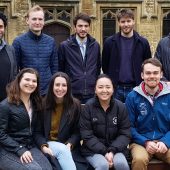
Dr Taha Yasseri
Former Senior Research Fellow
Taha Yasseri analyses large-scale transactional data to understand human dynamics, collective behaviour, collective intelligence and machine intelligence.

Mass-collaboration has always been fundamental to large-scale human achievements. Contemporary information communication technologies open up new ways to cooperate. Partners can interact remotely at unprecedented speed and exchange extremely large quantities of information. Examples of this new ecosystem include open software development and the World Wide Web, which Tim Berners-Lee originally developed at CERN in order to create an appropriate platform for the huge collaborations that are ubiquitous in high energy physics.
At present, all large-scale scientific projects from the Human Genome to the Hubble Space Telescope rely heavily on ICT mediated collaboration. This research will look at one particular type of large-scale Internet-mediated collaborations – Citizen Science projects. These projects facilitate the global public to directly contribute to ground-breaking scientific research that cannot be carried out solely based on academic resources. Specifically, we will investigate uses of the Zooniverse, by far the most successful citizen science project with nearly 900,000 users contributing to 20+ projects, which have led to more than 60 scientific papers across the sciences and humanities during its 4 year history.
However, its community of volunteers, the features and characteristics of their contribution patterns, their motivations and objectives, the ways that they satisfy them through different types of contributions, and many other social aspects of it are still unknown. In this collaboration between the Oxford Internet Institute and Oxford University’s Department of Physics, we aim to study the transactional records of the users’ activities in order to tackle some of these issues.
Peer-production and Internet-based mass collaboration have been studied extensively. In particular, Wikipedia, the most successful example of an internet-based collaborative environments, based on the idea of sharing pre-existing knowledge from secondary sources, has attracted more than 1000 research articles during the last decade (see WikiLit for a collection). However, Citizen Science projects, where users actually contribute directly to create knowledge and can do so with lower barriers to contribution, are fundamentally different and yet very under-researched. By performing numerical analyses on the activity logs we can produce a typology of users based on temporal features of their activity. We can also perform time series analysis to extract the modes of contribution and their dynamic characteristics.
This will help us understand the incentives for and participation patterns on the Zooniverse, and could help directly design a more efficient contribution platform and enhance engagement on the Zooniverse, as well as in other Citizen Science projects.
This project is funded by the John Fell Oxford University Press (OUP) Research Fund.

Former Senior Research Fellow
Taha Yasseri analyses large-scale transactional data to understand human dynamics, collective behaviour, collective intelligence and machine intelligence.

Former
Khairunnisa is interested in the digital representation of places and how these affect sense of place and place-making activities, the production, management and consumption of user-generated content, crowdsourcing and online mapping.